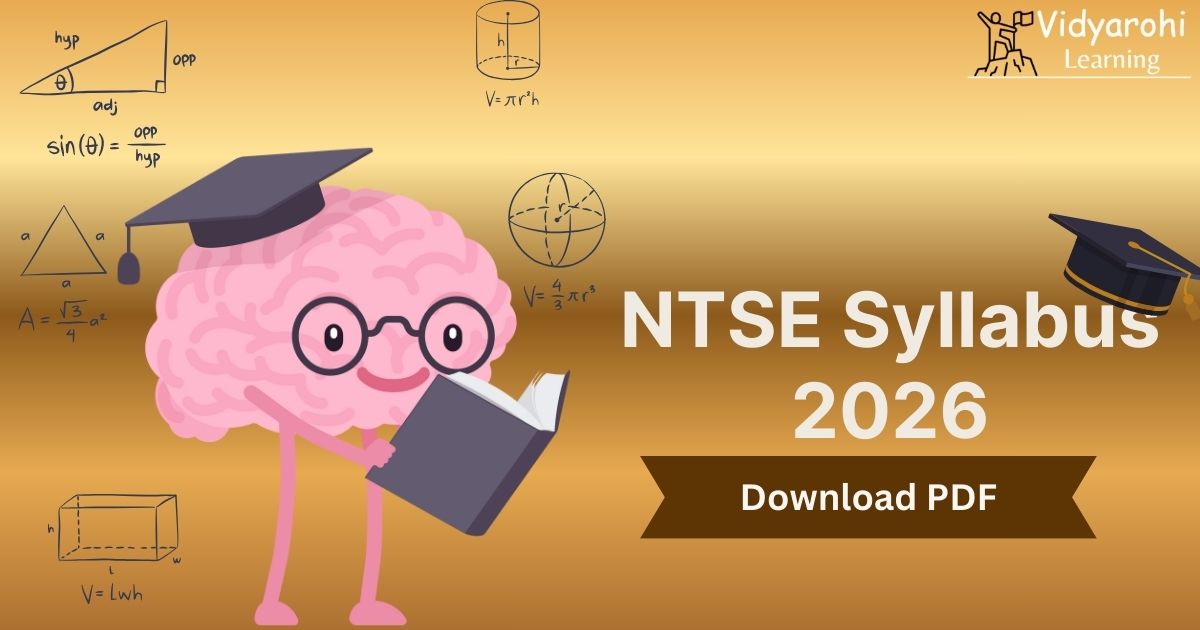NTSE Syllabus 2026: The National Talent Search Examination (NTSE) is one of the most prestigious scholarship exams in India for Class 10 students conducted by National Council of Educational Research and Training (NCERT). The exam aims to identify and nurture talented students by testing their knowledge, aptitude, and analytical skills. To score well in the exam, knowing the complete NTSE syllabus is the first and most important step. The NTSE syllabus 2026 covers key subjects like Mental Ability, Mathematics, Science, and Social Science, helping students focus on the topics that matter most.
The exam is conducted in two stages: Stage 1 at the state/UT level by state education boards and Stage 2 at the national level by NCERT. The NTSE tests students through two papers- Mental Ability Test (MAT) and Scholastic Aptitude Test (SAT). Understanding the syllabus also gives a clear idea of the paper pattern, marks distribution, and difficulty level of the questions. By studying the NTSE 2026 syllabus in detail, aspirants can create a smart study plan, prioritize important topics, and use their time more effectively. This article provides the detailed NTSE syllabus along with subject-wise important topics and weightage to help students prepare strategically. With the right approach and thorough knowledge of the syllabus, cracking NTSE becomes much easier.
Also Check,
NTSE Complete Study Material for 2026 exam
NTSE 2026 Syllabus PDF
The NTSE syllabus PDF outlines all the important topics that students need to study for the upcoming NTSE exam. This PDF provides the complete paper-wise subjects and topics that students need to cover for the NTSE exam. Aspirants can use the direct link given below to download the NTSE 2026 Syllabus PDF and start their preparation effectively.
| NTSE 2026 Syllabus PDF |
NTSE 2026 Paper-wise Syllabus
The NTSE 2026 syllabus tests students’ logical reasoning, problem-solving and analytical skills through the subjects like- Logical Reasoning, Mathematics, Science, and Social Science. To score well, students should clearly understand the key topics and their weightage. This helps them focus on high-scoring areas, prepare more effectively, and improve their overall performance in the NTSE 2026 exam.
NTSE MAT Syllabus 2026
In the NTSE exam, MAT Paper checks the candidate's logical reasoning, and analytical skills. The NTSE MAT Paper syllabus covers key topics such as Analogy, Verbal & Non-Verbal, Series Completion, Blood Relations, and Direction Sense Test. The list of topics that are usually covered in the NTSE MAT Syllabus is given below:
- Analogy (Verbal & Non-Verbal)
- Classification
- Series Completion (Number series, Alphabet series, Figure series)
- Coding–Decoding
- Blood Relations
- Direction Sense Test
- Puzzle Test
- Syllogism
- Statement & Conclusion / Assertion & Reason
- Analytical Reasoning
- Water Images and Mirror Images
- Embedded Figures
- Figure Completion & Pattern Completion
- Paper Folding and Cutting
- Venn Diagrams
- Mathematical Operations & Simplification
- Calendar, Clock, and Age Problems
- Non-Verbal Reasoning (Figures and Diagrams)
NTSE SAT Syllabus 2026
The NTSE SAT paper assesses candidates' general knowledge and understanding in various subjects, including Physics, Chemistry, General Science, Geography, History, and Polity. The following list provides a breakdown of topics.
| Sections | Topics |
| Mathematics |
|
| Physics |
|
| Chemistry |
|
| Biology |
|
| History |
|
| Geography |
|
| Civics |
|
| Economics |
|
| General Awareness |
|
NTSE Syllabus 2026: Subject-wise Weightage
The NTSE 2026 syllabus is designed to check candidates' aptitude and knowledge across various subjects. To evaluate this, the NTSE conducts an two stage offline exam consisting of two papers. The following table shows the subject-wise weightage of various subjects covered in both papers. It will help candidates focus on high-scoring areas and enable them to plan their preparation accordingly.
| Paper | Subjects Covered | Total Marks | Total Questions | Subject-wise Marks | Subject-wise Questions |
| Paper 1: MAT | Logical Reasoning | 100 | 120 | 100 | 100 |
|
Paper 2: SAT |
Science |
100 |
100 |
40 | 40 |
| Social Science | 40 | 40 | |||
| Mathematics | 20 | 20 |
NTSE 2026 Exam Pattern
Apart from understanding the syllabus, aspirants should also be familiar with the latest NTSE Exam Pattern 2026. The two stage exam consists of two papers on both the stage: MAT and SAT. Conducted by NCERT in offline mode, the NTSE exam comprises multiple-choice questions (MCQs) in both English and Hindi languages.
| NTSE 2026 Exam Pattern | |
| Exam Pattern |
Paper 1: Mental Ability Test (MAT) |
| Mode of Exam | Offline |
| Type of Questions | MCQ |
| Number of Questions |
100 Questions for each paper |
| Maximum Marks |
100 for each paper |
| Time Allotted |
2 hours for each paper |
| Language of Exam | Hindi and English |
| Marking scheme |
1 mark for each correct answer |
| Negative Marking | No |
How to Prepare for NTSE Syllabus 2026?
NTSE exam preparation requires a well-planned and structured strategy to excel in the exam. Here, we discuss some key points that aspirants should keep in mind while preparing for NTSE.
- Understand the Syllabus: First, familiarise yourself with the latest NTSE syllabus to get an idea of the topics covered in the exam.
- Create a Study Plan: After analysing the syllabus, create a study plan that covers all topics. Allocate specific time for each topic based on your strengths and weaknesses. The study plan sholud be aligned with the Class 10th Board Exam Preparation.
- Clear Basic Concepts: Focus on developing conceptual clarity for all topics in the NTSE syllabus. Understand the core concepts thoroughly.
- Practice Previous Year Papers: Solve NTSE previous years question papers to understand the exam pattern and types of questions asked. This will also help you to track your progress, identify weak areas, and improve time management skills. Analyse your performance after each paper to determine which topics need further revision.
- Create Short Notes: Make short and effective notes for quick revision, which will be helpful in the final weeks before the exam.
By following these strategies, aspirants can enhance their preparation and improve their chances of securing a high rank in the final merit list.


